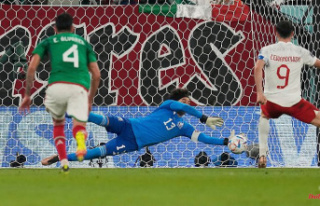Back in May, the Russian energy giant scaled back supplies through Ukraine over alleged transit problems. Now he is threatening to further reduce the amount of gas. Allegedly, parts of the gas were retained during transit through Ukrainian territory.
The Russian energy company Gazprom has accused Ukraine of allegedly withholding part of the gas when it transits its territory - and has therefore threatened to cut deliveries.
According to Gazprom, Ukraine has so far not forwarded 52.5 million cubic meters of Russian gas that was actually intended for the neighboring Republic of Moldova. If nothing changes, the transit, from which EU countries also benefit, will be reduced by the daily amount retained from next Monday. Gazprom did not name a specific volume.
Kyiv initially did not comment on the allegations, but had always emphasized in the past that it would comply with its contractual obligations. Despite the ongoing Russian war of aggression, Ukraine has transported around 15.6 billion cubic meters of Russian natural gas west since February 24 - more than ten percent of it to Moldova, according to its own statements.
In May, however, natural gas transit through the Russian-held Luhansk Oblast was suspended. Kyiv and Moscow accused each other of being responsible. Instead of the possible maximum amount of 109 million cubic meters, only a little more than 40 million cubic meters flow from Russia to Ukraine and further west every day.
Moldova, which lies between Romania and Ukraine and has around 2.6 million inhabitants, is one of the poorest countries in Europe. At the beginning of October, Gazprom cut back deliveries to Moldova, citing transit problems allegedly caused by Ukraine as the reason for the move. The pro-European leadership under President Maia Sandu, on the other hand, blames Moscow for the gas bottleneck and speaks of "political blackmail". Like Ukraine, Moldova was declared a candidate for EU membership in June.












